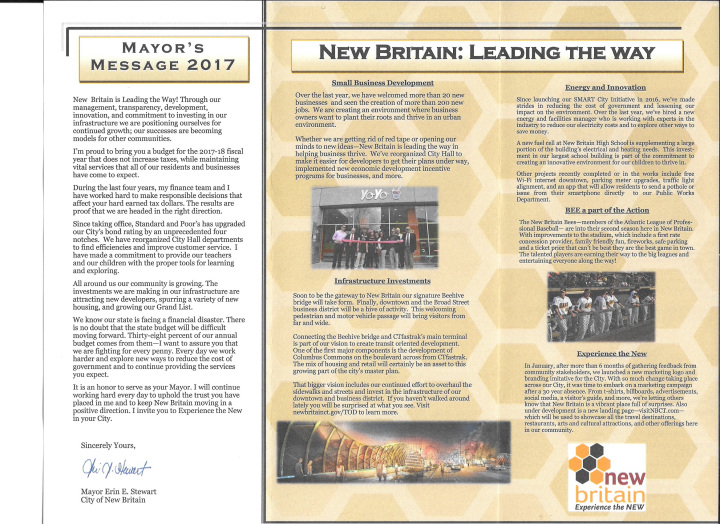
Top 10 of 2018: #7 – Stewart Found in Violation of Election Law
Many important stories have been covered by the New Britain Progressive in 2018. It may be difficult to name only a few articles as the top stories of the year, but there are a few the New Britain Progressive would like to share as our Top Ten. Other Top Ten stories can be found at “Top Ten Stories of 2018.”

Republican Mayor Erin Stewart violated state campaign law by illegally using taxpayer money to promote her 2017 re-election. That was the November, 2018 ruling of the State Elections Enforcement Commission (SEEC). (Stewart Penalized For Using Taxpayer Mailing To Boost Her 2017 Reelection Campaign)
The SEEC decision was in response to a complaint filed by New Britain Democratic Chair Bill Shortell a year earlier (Complaint Against Stewart Filed Over “obvious campaign promotion in car tax bills”). The scandal came to light in an opinion piece by John McNamara, published in the New Britain Progressive in September of 2017. (Did Stewart Get A Prohibited Campaign Freebie In Mailing Of Car Tax Bills?)
The SEEC found that Stewart illegally promoted her candidacy through a brochure inserted into an official mailing delivering tax bills to city residents during the 2017 municipal campaign. State law provides guidance on what forms of communication incumbent candidates can use in the run-up to an election by spelling out what public-funded communication they cannot use in Connecticut General Statutes (state law) Section 9-610(d), which, in part, says,
No incumbent holding office shall, during the three months preceding an election in which he is a candidate for reelection or election to another office, use public funds to mail or print flyers or other promotional materials intended to bring about his election or reelection.
The SEEC found that Stewart had violated this law when she used taxpayer funds to mail the flyer lauding her own administration of the city with city tax bills, “on or about September 1, 2017,” about two months before the 2017 city election in which Stewart was running for re-election.
As a penalty, the SEEC ordered that Stewart, “shall pay a civil penalty in the amount of five hundred dollars ($500.00) for her violations of General Statutes § 9-610…”
When the Democrats’ complaint on this matter was filed with the SEEC in September of 2017, Stewart’s campaign had said that the, “allegations lack merit.” But the SEEC did not agree.
However, the SEEC did rule in 2018 that there was no merit to a complaint by Republican Party Chair Anthony Cane against 2017 Democratic mayoral candidate Merrill Gay. (Republican Accusations Thrown Out: Merrill Gay Vindicated) That 2017 complaint was tossed out in March of 2018, with the SEEC concluding the allegations were either untrue or, “even if true, would not have amounted to violation of Connecticut’s election laws.” The only net result of Cane’s complaint was causing several teenagers who participated in the democratic process by supporting Gay’s campaign to face questioning by the SEEC about Cane’s accusations – accusations which the SEEC then dismissed, saying that, it, “upon investigation, found no support for the allegations.”
But the decision by the SEEC, that confirmed the Democrats’ accusation on Stewart’s violation of election law, was one the New Britain Progressive’s Top Ten stories of 2018.
Stewart Penalized For Using Taxpayer Mailing To Boost Her 2017 Reelection Campaign
December 1, 2018
by John McNamara
Mayor Erin Stewart violated state campaign law by promoting her candidacy through an official mailing of tax bills to city residents during the 2017 municipal campaign, according to a ruling by the State Elections Enforcement Commission (SEEC).
The SEEC, at its November 14th meeting, fined Mayor Stewart $500, citing a violation under state law (9-610) that prohibits incumbents “during the three months preceding an election in which (she) is a candidate for reelection or election to another office” from using “public funds to mail or print flyers or other promotional materials intended to bring about his (or her) election or reelection.”
Using her campaign slogan “Leading The Way” in the taxpayer-funded brochure, Stewart cited saving the city from fiscal ruin, good bond ratings, reorganizing city hall departments “to find efficiencies and improve customer service” and “a continuous commitment to provide our teachers and our children with the proper tools for learning and exploring.” The official message was a carbon copy of what could be found at the time on Stewart’s campaign website. The mailing with the brochure was sent by Tax Collector Cheryl Blogoslawski’s office and paid for by the city.
During the SEEC inquiry Mayor Stewart, through an attorney, defended her use of the mailing at the height of the municipal election season. “The pamphlet is issued annually and is sent in the same envelope with our property tax bills. Given the lack of a timely issued state budget and the commensurate uncertainty surrounding final municipal aid (and, therefore, our tax rate), New Britain joined many other municipalities across Connecticut in electing to post the property tax bills later than normal this fiscal year,” Stewart argued. She contended that the “message from the Mayor to taxpayers” and “a section discussing progress made by the City in numerous areas” contained “nothing of a political nature.” The mailing at issue was first reported in September 2017 in an NBPoliticus post and in a story published by the New Britain Progressive.

Rejecting the Mayor’s argument on a complaint brought by Democratic Town Chair Bill Shortell, the SEEC found that Stewart’s “message from the Mayor” and the citing of New Britain’s accomplishments “are irrelevant to the tax bill and therefore their inclusion in the mailer is violative of 9-610. The Commission finds that the mailer plainly could have been limited to the mill rate and various other information regarding motor vehicle taxes in New Britain, without including favorable references to the budget and past performance of the Mayor of New Britain and her administration.”
Editor’s Note: This article was also published on NBPoliticus.
Other related and similar articles:
Democrats Blast Stewart Over Violation
Did Stewart’s Use of Main Street USA Advertising Violate Campaign Laws?
Reportedly False Attempt to Bury Article on Stewart Tax Mailing Elections Complaint



